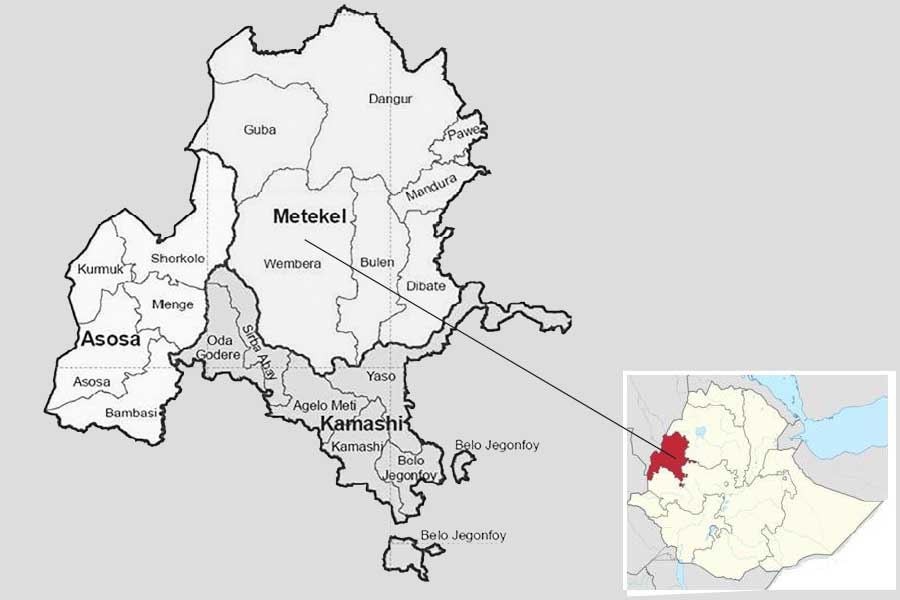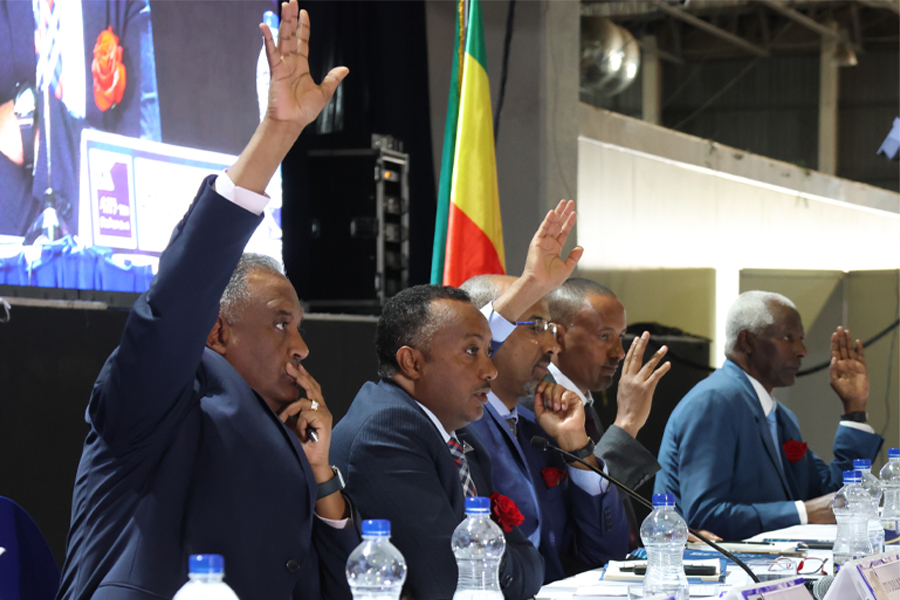
Fineline | Jan 04,2020
Feb 13 , 2021.
What most spooked buyers owning a billion dollars of Ethiopia’s Eurobonds was not a conflict in the north that plunged the nation into (un)civil war, perhaps threatening to take the Horn of Africa with it. The war had its mark, leading to a slump despite a bond rally for other emerging markets. But what led to the biggest fall on record were reports of Ethiopia's intentions to ask for its debt to be restructured by its creditors.
There are a few things exemplary of Ethiopia’s grudging entry into the global market when a report suddenly makes the country’s macroeconomic circumstances even more precarious. This is especially true of how fickle and unpredictable investors are. Such a rapid selloff on the back of speculation — though well-informed — that goes on to complicate macroeconomic conditions would have been unimaginable in this largely traditional and agriculture-based economy of Ethiopia just a couple of decades ago.
But the unfamiliar waters of the global capital markets are bound to have headaches for Prime Minister Abiy Ahmed (PhD), who is eager to join. His administration may not have disciplined and assertive policymaking and governance to match on the domestic side of the aisle.
Taken unilaterally, the Ministry of Finance’s decision to “utilise all mechanisms at its disposal” is not imprudent. But the timing of readjusting from a developmental state economic model to a less activist state could not have been worse. This was the time for governments across the world to gamble on sustaining large budget deficits, hoping to support demand in their economies. No doubt fiscal stimulus requires the role of the state out of necessity. The problems the world is confronted with are far too big for markets alone to deal with.
The biggest offender is the Novel Coronavirus (COVID-19) pandemic, which led to lockdowns that blunted business activities and nearly turned the tap off on tourism revenues. The case is similar in other countries, particularly in the developed economies, from where remittances to Ethiopia have plummeted. The political uncertainty and insecurity took care of the rest, curbing foreign direct investment and leading to several interruptions in transportation and communications, all affecting productivity.
The Federal Police Commission estimates 2.9 billion Br in losses were incurred due to damage to infrastructure and interruption of services during the conflict in Tigray Regional State alone. Moreover, the loss of nearly two billion Birr in domestic taxes over the past three months goes so far in highlighting productivity losses. Federal tax authorities should have little optimism on the prospect of mobilising domestic revenues from Tigray, reaching two percent of federal revenues planned for the fiscal year.
There were some positive surprises, perhaps none more than the export performance of gold, earning the country more in dollars than coffee for the first time in decades. In six months, gold exports fetched almost double the entire period of last year at 340 million dollars. But this may have been chance more than the improvements in the supply chain and better incentives for formalising transactions. An argument to the former, indicating that this performance might not last, is that commodity prices have risen in the global market, especially gold, which rose last August to its highest point in history.
But the net result is a harsh macroeconomic environment that has left the government with little wiggle room. Even the Prime Minister argued in opinion pieces to the international press that this day may come. The rich world's initiatives on debt suspension are necessary to help the Global South cross the challenging times.
Last June, Ethiopia signed on to the G-20 Debt Service Suspension Initiative (DSSI), which temporarily suspends debt service payments until June 2021. The country is among 73 in the world that is eligible for the initiative and among 40 that have tapped into the five billion dollars in relief that has been provided thus far. This is an amount equal to the average external financing requirement by Ethiopia.
The government also used its entire quota of 411 million dollars under the Rapid Financing Instrument by the International Monetary Fund (IMF) to meet “urgent balance of payment needs stemming from the COVID-19 pandemic.”
The recent support Ethiopia’s government intends to ask for goes beyond bilateral engagements. The new debt service initiative — Common Framework for Debt Treatments — signed in November 2020 with the G20 and Paris Club members takes it up a notch. It requires Ethiopia to turn to private creditors — who hold 3.3 billion dollars of its total debt — for a restructuring. This amount claims almost 14pc of Ethiopia's external debt exposure.
Such is a new development that exposes the economy's vulnerabilities: a deficit in the current account; dilapidated foreign currency reserves; and a rising amount of dollars to service Ethiopia's debt to international creditors, mainly China. These can directly impact bondholders (who are paid at least 66 million dollars annually) and creditors to local enterprises.
Ethiopia will be only one of the two countries, after Chad, if it implements this restructuring exercise; it is untested. It may work out, especially if the government is interested in restructuring a smaller portion of the debt. It may not be required to get a comparable offer from private creditors. However, this uncertainty, including from Ethiopia’s side, which has yet to decide as it is still assessing its debt sustainability in cooperation with the IMF, has combined to represent to Fitch, an American credit rating agency, a downgrading to CCC. This rating indicates a higher likelihood of default.
For policymakers such as Yinager Dessie (PhD) of the central bank and Eyob Tolana (PhD) of the Finance Ministry, this should be devastating news, considering how far they have gone to impress private creditors and please multilateral institutions such as the World Bank.
Take the galloping inflation the government has been willing to risk, which at least partly is owed to the IMF’s recommendation to move toward a market-clearing exchange rate. With the Birr's value gradually slashed by a third against a basket of major currencies over last year, inflation has hovered around 20pc. The cost of living ballooned, taxing the poor and those in the fixed income group heavily. Make no mistake, this will have significant political implications, especially for an administration facing upcoming national elections.
Granted, budget deficit and debt levels have also been moderate compared to the growth in the gross domestic product (GDP) and a commendable decrease in debt held by state-owned enterprises (SOE) and current account deficits. Unfortunately, these are not making enough of a dent to address the massive gap in external financing requirements, mostly the measly three billion dollars in forex reserves. The country is in a bind with its external finances.
There are changes Ethiopian policymakers can take to address the problem. It could be found in the meaning of Fitch’s CCC rating, which indicates a high risk of default but one predicated upon prevailing economic conditions.
These conditions could be alleviated by, to begin with, mending the country’s image on the international stage. Organisations such as the European Union have become increasingly vocal against the government’s actions in Tigray Regional State, hence the recent suspension of 107 million dollars in aid. The international community may overlook authoritarianism or even war, but a humanitarian crisis is extremely unpopular with their voters at home. As recently struck with the World Food Programme, engagements are necessary to ease the negative assumptions of the government’s motives and practices.
The administration has to relent to the world's demands to allow unfettered humanitarian access; permit independent investigations of the alleged crimes; cease active hostilities; and ensure Eritrean soldiers are out of the country. This is as good a moral argument as it is an economic one.
The government would also need to go back to its promises of tightening its belt. Here is an administration that runs 12 projects estimated to cost over 50 billion Br, all matters of beauty and glamour. Such spending contributes to inflation, and it may be time to reconsider them. It is wise to be reminded of Edmund Burke's wisdom, "Beauty is never a sign of power's vitality; it is always a sign of decadence."
On the international front, the government has little choice but to lobby for clarification and early implementation of debt suspension under the Common Framework. Indeed, bilateral creditors have cause to oblige. How Ethiopia is treated under this initiative will serve as a test. Failure could potentially send a shockwave that leads to a slump on bonds of other countries with weaker credit ratings.
As on the political front, Ethiopia's economic future is precarious. It is an acid test if policymakers will rise above the challenge.
PUBLISHED ON
Feb 13,2021 [ VOL
21 , NO
1085]

Fineline | Jan 04,2020

Commentaries | Aug 03,2024

Sponsored Contents | Mar 28,2022

Commentaries | Feb 01,2019

Editorial | Jun 12,2021

Agenda | Nov 07,2020

Commentaries | Nov 16,2024

Radar | Oct 20,2024

Radar | Oct 02,2021

Viewpoints | Jun 08,2019

My Opinion | 131974 Views | Aug 14,2021

My Opinion | 128363 Views | Aug 21,2021

My Opinion | 126301 Views | Sep 10,2021

My Opinion | 123917 Views | Aug 07,2021

Dec 22 , 2024 . By TIZITA SHEWAFERAW
Charged with transforming colossal state-owned enterprises into modern and competitiv...

Aug 18 , 2024 . By AKSAH ITALO
Although predictable Yonas Zerihun's job in the ride-hailing service is not immune to...

Jul 28 , 2024 . By TIZITA SHEWAFERAW
Unhabitual, perhaps too many, Samuel Gebreyohannes, 38, used to occasionally enjoy a couple of beers at breakfast. However, he recently swit...

Jul 13 , 2024 . By AKSAH ITALO
Investors who rely on tractors, trucks, and field vehicles for commuting, transporting commodities, and f...

Jul 6 , 2025 . By BEZAWIT HULUAGER
The federal legislature gave Prime Minister Abiy Ahmed (PhD) what he wanted: a 1.9 tr...

Jul 6 , 2025 . By YITBAREK GETACHEW
In a city rising skyward at breakneck speed, a reckoning has arrived. Authorities in...

Jul 6 , 2025 . By NAHOM AYELE
A landmark directive from the Ministry of Finance signals a paradigm shift in the cou...

Jul 6 , 2025 . By NAHOM AYELE
Awash Bank has announced plans to establish a dedicated investment banking subsidiary...